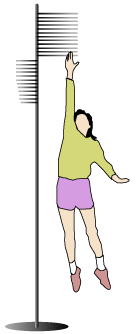The physical demands vary greatly among the track and field disciplines, therefore the appropriate tests for each discipline and for specific athletes will vary greatly. For example, endurance athletes will be interested in their VO2max, while field athletes will want to know about their power and strength. There are also examples for endurance, sprints, jumps and throwing athletes that are used for the eTID program from the Australian Institute of Sport.
Endurance Events
The endurance events range from the middle distance events (800m, 1500m), to longer distance such as the Steeplechase, 5000m, 10,000m, marathon, walking events. Endurance capacity is important for all these, and the choice of tests for testing this capacity is large. The test should be a running based test, and ideally a treadmill VO2max test. This is sometimes difficult to get done, so alternatives include 1.6 km run or other run tests, and the popular beep test. See endurance tests for other ideas.
Sprint Events
The sprint events are the 100m, 200m, 400m, hurdles (110/100m, 400m) and relays (4x100m, 4x400m). Obviously top running speed is very important for sprinters - this can be measured with a running sprint test. You would also want to know about acceleration, which can be determined by measuring speed over 5 or 10 meters during a longer sprint test. Explosive leg power should also be measured using a test such as the vertical jump test. See more about fitness testing for sprinters and an example.
General
There are many tests that are appropriate for all athletes, such as the range of anthropometrical tests: skinfolds, height and body mass (more about anthropometry at T&F). There are specific tests depending on the athletic discipline that you are interested in, which are outlined below. Multi-events (decathlon and heptathlon) would require a larger range of tests to reflect the range of events that they have to complete. The tests listed below are not an exhaustive list - check out the complete list of fitness tests.
Jumping Events
The jumping events are Long Jump, High Jump, Triple Jump and Pole Vault. Power and speed are the critical physical attributes for jumping events. For measuring explosive leg power you should conduct the vertical jump test or standing long jump. Speed is also very important for jumpers - this can be measured with a running sprint test.
Throwing Events
The throwing events are Discus, Shot Put, Javelin and Hammer Throw. The primary fitness component for throwers is power. For measures of throwing power and ability there is a standard cricket ball throw test or a range of medicine ball tests. For measuring explosive leg power you should conduct the vertical jump test. Additional anthropometric test you may want to do for a thrower are arm span and sitting height.
Related Pages
- eTID testing for athletics
- Fitness Testing for Sprinters
- Fitness Testing for other Sports including sport-specific tests
- Complete List of Fitness Tests
- Poll: fitness components for long jump


 Upcoming Events
Upcoming Events